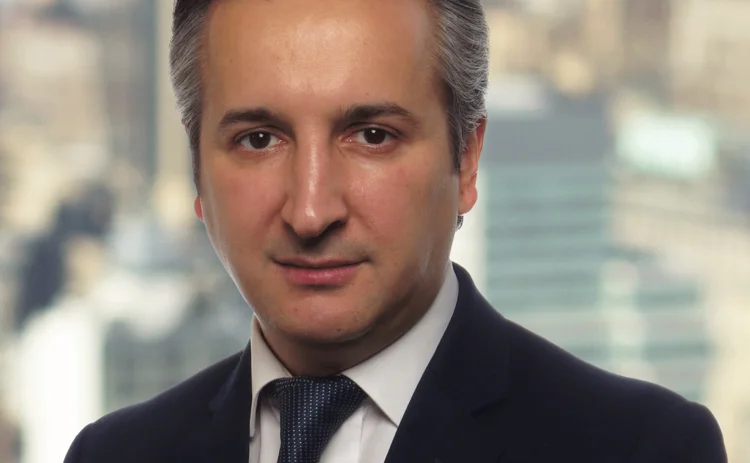
Equity derivatives house of the year: JP Morgan
Risk Awards 2022: US dealer filled flow gaps with a little help from some robots

Last year’s red-hot equity market afforded equity derivatives desks plenty of opportunities for money-making – and a few ways to lose it all. JP Morgan seized the upside and deftly sidestepped the traps.
The bank’s prime brokerage unit did not have Archegos Capital Management as a client – a relief when the family office’s concentrated equity swap portfolio imploded, leaving its counterparties with more than $10 billion in combined losses. JP Morgan’s equities business was also alive to the possibility of a retail uprising some six months before the meme-stock frenzy caused some heavily shorted shares to soar in value.
Rising markets punctuated by severe bouts of volatility favour the most complete franchises – and few can claim to be as complete in equity derivatives as JP Morgan. In 2021, the bank bolstered its long-standing exotics pedigree with big advances in flow, thanks in part to an expanding fleet of robots.
“For a sustainable model, you need to be complete,” says Jason Sippel, JP Morgan’s global head of equities. “You need to be in all regions, all products. You definitely want a strong prime footprint [and] you want a strong cash footprint. We absolutely used our strength in those segments, particularly in the US, to penetrate clients.”
Rachid Alaoui, the banks head of global volatility, puts it more emphatically. “The last few years, we cracked it,” he says. “I really think we’re complete: top in corporate, exotics and flow.”
JP Morgan’s equity trading division generated 22% earnings growth in 2021 and topped $10 billion in annual revenue, closing the gap on rivals Goldman Sachs and Morgan Stanley. The bank has doubled its market share in US flow – arguably the weakest link in its equity franchise historically – in the past two years, claiming 14% of the revenue wallet in the first half of 2021, according to Coalition.
“How we got here is by investing in people across sales and trading [and] investing in technology,” says Scott Mitchell, co-head of global equity derivatives sales. Equally important was a change in mindset. “In getting from where we were to where we are, there was a fundamental shift in culture. When we go to clients we haven’t previously connected with, we want to earn the right to be their first call or second call as if we didn’t have JP Morgan’s name on the door.”
A market-wide rotation from indexes to single stocks – an area the bank had earmarked for improvement – acted as a tailwind. “Flow has changed in the last few years,” says Alaoui. The past year was characterised by low volatility on indexes with a massive amount of dispersion, due in part to retail participation. “Single stock is the place to be,” he says. “Both fortuitously and by design, we’ve feverishly built out our single-stock capabilities because we were a long way behind the leaders. That really landed in the last two years.”
The last few years, we cracked it. I really think we’re complete: top in corporate, exotics and flow
Rachid Alaoui, JP Morgan
The exotics business was no slouch either, doubling revenues in what was an “extraordinarily successful” year, according to Rui Fernandes, the bank’s global head of equity derivatives structuring. He adds that the growth was powered by “the sheer volume and number of trades we’ve done,” rather than large, episodic transactions.
“It’s a continuation of the theme on the flow side when it comes to automation, usage of data and using our resources. It’s very much about the ability to price more trades, smaller tickets, and be more integrated with clients and workflows,” Fernandes says.
That doesn’t mean the bank turned its back on large-ticket trades. “When JP Morgan has something to do, they generally have a lot to do,” says a buy-side volatility trader. “While some banks might come to you with 20 or 30 good trades, JP Morgan might come with three or four, but they’ll be able to do a lot of size.”
Clients who spoke to Risk.net singled out the bank’s depth of inventory as well as the quality of its personnel and technology capabilities. Others described it as a trusted partner, noting they didn’t have to second-guess the incentives behind every feature in a strategy.
Rise of the robots
In recent years, JP Morgan has been at the forefront of efforts to apply artificial intelligence and machine learning to derivatives trading. The equities division has led the charge.
The bank already uses a machine learning system called Flow Trader to price as much as 70% of its Euro Stoxx 50 options book. The system currently handles around half of its S&P 500 options trades, though this is projected to jump to 70–80% in the first half of 2022, when the bank also plans to add the first single names.
While internal studies have shown these data-driven strategies outperform classical models based on risk sensitivities, their main benefit is efficiency. Quote times have dropped from between five and 10 minutes to around five seconds using Flow Trader.
“The machine is meant to be able to trade lots of small tickets very well. We built out our data assets and execution capabilities and now we’re in a position where we think we can use modern AI techniques to learn to trade even better,” says Hans Buehler, JPM’s global head of equities analytics, automation and optimisation. “The idea is that with the machine using better data and better insights, eventually we have even better pricing, which will make it easier for us to scale.”
The bank is now testing a more advanced machine learning technique capable of handling exotic payoffs – called deep hedging – with a pilot for cliquet options already in full swing.

“Deep hedging is a real thing and is quite exciting, but it will be a more product-centric roll-out,” says Sippel. “The cliquet space is where we’re launching and if we’re fully happy with performance, we’ll build that out. Eventually, we get to single-stock exotics using deep hedging – that’s the apex application.”
The bank is adamant that these innovations are not a back-door route to cutting trading roles. Instead, the focus is on relieving traders of repetitive tasks and freeing up more time to speak to clients or work with the firm’s AI developers.
“I’d be extremely happy if traders can get 80% of their time out of the way and actually spend time with sales partners, talking to hedge funds and asset managers to give people insight into what’s going on in the markets,” says Alaoui. “That essentially leads to stronger relationships and more business down the line.”
The machines are already unlocking opportunities in corners of the market that commonly slip through the cracks at bulge-bracket banks – such as middle-market clients with infrequent requests or low trade-to-quote ratios, who “may iterate a million times before pressing the button,” according to Alaoui. “These clients have been very happy with the evolution of us moving them to be quoted by machine.”
Machine learning techniques are also easing the burden of pricing of autocallable bonds. These retail favourites, which pay above-market coupons while underlying stocks or indexes remain between upper and lower bounds, expose banks to an array of exotic risks. Issuers of the structures must run cumbersome Monte Carlo simulations to model the stochastic volatility element.
This can take several minutes for individual products – adequate for a single quote, but time consuming when clients request multiple product iterations, sometimes running into the hundreds.
Using deep neural networks, complex non-linear functions such as the stochastic volatility charge can be quickly predicted. Once again, it’s the need for more efficiency rather than greater accuracy that is driving the initiative, and the bank compares the tool to “an experienced trader with an infinite memory”.
This approach has already been used to generate around 30,000 autocall quotes, saving over 1,000 hours of calculation time. There are no plans to replace classical models entirely, however. The traditional approach is still used to price and risk manage newly issued instruments and to generate risk sensitivities, or Greeks, for hedging.
Word games
The equities business has also used natural language processing (NLP) – powered by machine learning – to create a new generation of thematic investing products. In partnership with data analytics firm RavenPack, JP Morgan’s Quest framework scours news data from more than 19,000 sources to quantify the thematic exposure of over 40,000 companies.
This approach aims to address shortcomings in fundamental classification, whereby stocks are assigned to a specific sector based on their primary sources of revenue. The classical method typically limits companies to a single segment and fails to reflect dynamic changes in the revenue mix, particularly with regards to new market segments.
The Quest algo creates baskets on diverse themes by screening stocks using keyword news searches. This approach typically delivers the usual suspects plus a few surprises. For example, Tesla was picked by the algo as part of a cryptocurrency theme.
The bank has created more than 20 thematic indexes this way, raising in excess of $500 million notional.

The Quest algo is just one reason for a 30% jump in the overhauled strategic index business led by Stephane Audran and Arnaud Jobert. With $15 billion of inflows in 2021, including $5 billion into defensive momentum and volatility strategies, assets under management hit $65 billion by year-end.
The bank also turned to NLP to make sense of the social media chatter that unleashed the meme-stock frenzy in early 2021. JP Morgan already had an inkling of what was to come – six months earlier, David Portnoy, founder of Boston-based sports blog Barstool Sports, had led an army of locked-down followers into the stock market at the height of the Covid-19 pandemic. A perfect storm of work-from-home policies, government stimulus packages and commission-free trading from brokers such as RobinHood lured record numbers of day traders into the stock market. Retail investors suddenly found power in numbers, co-ordinating their bets on social media sites such as Reddit, and driving a handful of stocks to sky-high levels.
While JP Morgan’s client base is largely institutional, it still found opportunities in the apparent of democratisation of stock trading. The bank focused its efforts on capturing high-frequency data on retail flows.
“We’re seeing more quant funds looking for that type of data, so we worked with quantitative research colleagues to use NLP analysis on retail social media activity to come up with products we can sell to clients,” says Ludovic Peiron, co-head of global equity derivatives sales.
In September, the bank launched a new research series called ‘Through the Retail Lens’, which uses NLP to predict retail activity on more than 5,000 stocks and 2,500 exchange-traded funds and to recommend short-term, long-only strategies. Peiron says the product has been “a massive success”.
Far from a threat, Sippel sees the growing participation of retail investors as a positive for the market. “There’s a lot more liquidity and depth now in single stocks, so you can trade more comfortably in large size. Our risk-taking generally in single-stock flow has gone up dramatically, partly because we’ve gotten bigger and better at it, but it also reflects the nature of the market.”
Out of the box
For structured products issuers, 2021 was a year for re-evaluation of risk/reward profiles after pandemic-induced turbulence cost three French dealers more than €800 million ($908 million) a year earlier.
JP Morgan weathered the 2020 storm but sought to future-proof the business by reducing risk.
The bank struck a partnership with index start-up MerQube, taking a 10% stake in the company. The first product to result from the alliance, the Nasdaq Tech+ Vol Advantage Index, provides exposure to Nasdaq 100 futures with a 35% volatility target with a 6% decrement. This reduces volatility and dividend exposure for JP Morgan and offers more consistent – and improved – pricing to investors. A unique feature is the use of a one-week realised volatility control rather than daily implied vol, which exposes the provider to gap risk. In 2021 the index outperformed its benchmark, delivering 32% performance against 21% on the main tech index.
“It allows JP Morgan to price less risk for our money and ultimately result in better pricing for clients. It’s a win-win dynamic when we design underlyings that are not so sensitive to risk changes, as we will have far bigger risk appetite so we can do more of them, and at a better risk-adjusted price for the end-user,” says Alaoui.
As an example, an 18-month product can deliver yields in excess of 8% compared to around 7.5% for a worst-of structure on the S&P 500, Russell 500 and Euro Stoxx 50. Knockout rates are improved by around 5%.
Within two months of launch, the bank had sold over $150 million of autocalls linked to the index – a run rate which exceeds that of blockbuster index products such as Mozaic. It is now casting its ambitions further afield.
“We have a number of other distributors looking at the index, tracking its live performance, and expect them to add the product to their platforms. We’re in conversation with some insurance carriers as well,” says Mitchell. “MerQube has the potential to be front and centre.”
Only users who have a paid subscription or are part of a corporate subscription are able to print or copy content.
To access these options, along with all other subscription benefits, please contact info@risk.net or view our subscription options here: http://subscriptions.risk.net/subscribe
You are currently unable to print this content. Please contact info@risk.net to find out more.
You are currently unable to copy this content. Please contact info@risk.net to find out more.
Copyright Infopro Digital Limited. All rights reserved.
As outlined in our terms and conditions, https://www.infopro-digital.com/terms-and-conditions/subscriptions/ (point 2.4), printing is limited to a single copy.
If you would like to purchase additional rights please email info@risk.net
Copyright Infopro Digital Limited. All rights reserved.
You may share this content using our article tools. As outlined in our terms and conditions, https://www.infopro-digital.com/terms-and-conditions/subscriptions/ (clause 2.4), an Authorised User may only make one copy of the materials for their own personal use. You must also comply with the restrictions in clause 2.5.
If you would like to purchase additional rights please email info@risk.net
More on Awards
Market data provider of the year: S&P Global Market Intelligence
S&P Global Market Intelligence has consistently met demands across Apac’s fast‑evolving capital markets, securing its win at the Risk Asia Awards 2025
Best user interface innovation: J.P. Morgan
J.P. Morgan wins Best user interface innovation thanks to its Beta One portfolio solution
Market liquidity risk product of the year: Bloomberg
Bringing clarity and defensibility to liquidity risk in a fragmented fixed income market
FRTB (SA) product of the year: Bloomberg
A globally consistent and reliable regulatory standardised approach for FRTB
Best use of cloud: ActiveViam
Redefining high-performance risk analytics in the cloud
Best use of machine learning/AI: ActiveViam
Bringing machine intelligence to real-time risk analytics
Collateral management and optimisation product of the year: CloudMargin
Delivering the modern blueprint for enterprise collateral resilience
Flow market-maker of the year: Citadel Securities
Risk Awards 2026: No financing; no long-dated swaps? “No distractions,” says Esposito







